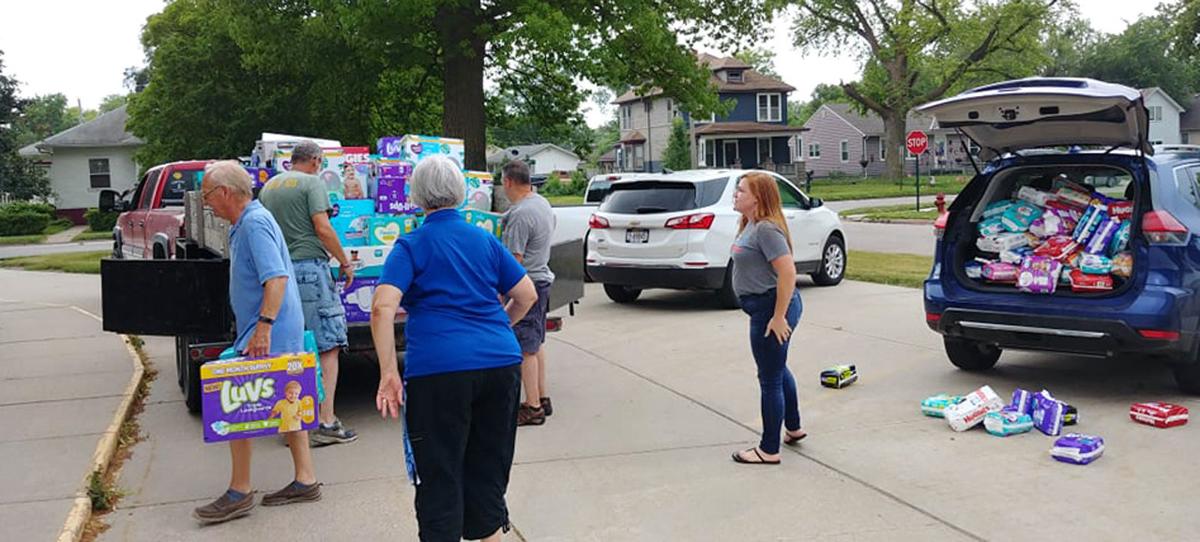
As unemployment has climbed and household budgets have been stretched thinner and thinner, more families and individuals have been forced to make impossible decisions about how to spend limited financial resources. Do I pay rent, or do I buy diapers? Do I get dinner, or do I buy tampons?
Nationally, one in three families struggle to afford a sufficient supply of a diapers to keep children clean, dry and healthy, or what we call “diaper need.” What’s more, one in four menstruating people struggle to afford period products including pads and tampons, or what we call “period poverty.” Both are pressing health equity issues in the U.S. and North Carolina.
A sufficient supply of diapers represents an enormous financial burden for many families, with disposable diapers costing $70-$80 per month per baby. Research shows that diaper need is associated with feelings of guilt and shame and elevated depressive symptoms among mothers. Research also shows that diaper need can hinder work, school, and childcare attendance as many centers require children to be dropped off with a day’s supply of disposable diapers.
Similarly, studies have found that period poverty is associated with depression and anxiety and that all too often, period poverty results in menstruating people missing school and work.
Many families have found it increasingly difficult to afford diapers and period products during the COVID-19 pandemic. Problematically, however, these items are not an allowable expense in many public safety net programs, including WIC (Special Supplemental Nutrition Program for Women, Infants, and Children) and SNAP (Supplemental Nutrition Assistance Program), also called food stamps.
Across the U.S., more than 200 local diaper banks participate in the National Diaper Bank Network. This network of nonprofits works to fill the gap in basic needs unmet by federal or state assistance. As the COVID-19 pandemic has continued to affect millions of individuals and families, local diaper banks have experienced more than a doubling in demand for assistance from their communities.
In response to the pandemic, the Diaper Bank of North Carolina (DBNC) has expanded efforts to ensure that North Carolinians have access to essentials. From March to July 2020, DBNC distributed nearly 1.2 million diapers and period products. Compared to this same time last year, there has been an 800% increase in distribution of period products and a 220% increase in distribution of adult incontinence products.
To ensure that families can safely get needed supplies, DBNC has established new partnerships with health and social service agencies across the state to set up “diaper drive-thrus.” DBNC also stepped in to fill a gap for the North Carolina National Guard by providing more than 12,000 period products for menstruating service members during the pandemic. In addition, DBNC has stocked a local hospital with period and adult incontinence supplies as it prepares for potential surges in COVID-19 cases.
Local diaper banks like DBNC play a critical role in ensuring that individuals, families and communities have access to basic essentials. However, these nonprofit organizations alone cannot meet the incredible demand for assistance. State and federal policies, such as repealing sales tax on diapers and period products and creating dedicated funding to support diaper and period product distribution to low-income families, are required to supplement the efforts of local diaper banks and reach a greater number of those in need.
The COVID-19 pandemic has highlighted the urgent need for these policies to ensure the health, safety and economic well-being of children and families, particularly in times of crisis. Opportunities to contribute to the efforts of the National Diaper Bank Network and local diaper banks like DBNC include donating monetary donations, volunteering time and advocating for policy change.
National Diaper Need Awareness Week, Sept. 21 – 27 will offer many opportunities for North Carolinians to get involved. Diapers and period products are essential. Meeting these basic needs promotes equity and builds healthy communities.
Anna Austin is an Assistant Professor at the UNC Gillings School of Global Public Health. Kelley Massengale is the Director of Research and Evaluation at the Diaper Bank of North Carolina.
- Total: 35
- 30
- 4
- 0
- 1
September 09, 2020 at 12:41AM
https://ift.tt/3bFO68N
"Diaper need" and "period poverty" are among the hidden and destructive impacts of the COVID-19 recession - ncpolicywatch.com
https://ift.tt/2Comt7j
Diapers

No comments:
Post a Comment